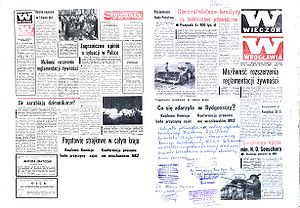
Bydgoszcz events
Encyclopedia

This forced the authorities to finally hold the meeting of the Voivodeship National Council, a governing body of the Bydgoszcz Voivodeship
Bydgoszcz Voivodeship
Bydgoszcz Voivodeship was a unit of administrative division and local government in Poland in the years 1975–1998, superseded by Kuyavian-Pomeranian Voivodeship. Capital city: Bydgoszcz Area: Statistics : Population: inhabitants...
. The meeting was attended by several members of the Solidarity, among them Jan Rulewski
Jan Rulewski
Jan Rulewski is a Polish politician, activist of Solidarity; a Member of the Polish Sejm and a Senator .He was in charge of the Bydgoszcz region of Solidarity...
, Mariusz Łabentowicz and Roman Bartoszcze
Roman Bartoszcze
Roman Bartoszcze is a former Polish agrarian politician from Polish People's Party .From 1969 to 1980 he was a member of Polish United Workers' Party satellite United People's Party . In 1980 he broke with ZSL and joined oppositional Peaseant Solidarity, which was merged into Solidarity movement...
, who were to explain the reasons for the strike. However, the Council decided not to discuss the issues related to agriculture, which made the members of the Solidarity protest. The authorities responded by calling in the Citizen's Militia and the ZOMO
ZOMO
Zmotoryzowane Odwody Milicji Obywatelskiej , were paramilitary-police formations during the Communist Era, in the People's Republic of Poland...
, who entered the seat of the Council and brutally pacified (beat up) the delegates of the Solidarity.
Despite the fact that the authorities had a monopoly on media, the underground press reported of the Bydgoszcz events and the matter became widely-publicised in a matter of days. On March 24 the Solidarity decided to go on an all-national strike
1981 warning strike in Poland
In the early spring of 1981, the quickly growing Solidarity movement faced one of the biggest challenges in its short history, when during the Bydgoszcz events, several members of Solidarity, including Jan Rulewski, Mariusz Łabentowicz and Roman Bartoszcze, were brutally "pacified" by the...
in protest against the violence aimed at the delegates. The communist authorities bent down and on March 25 the deputy prime minister Mieczysław F. Rakowski started a conference with the leaders of the Solidarity. This led to the signing of the so-called Warsaw accords on March 30, 1981. According to the agreement, the Solidarity was allowed to report the Bydgoszcz events in the public television (the first such independent news behind the Iron Curtain
Iron Curtain
The concept of the Iron Curtain symbolized the ideological fighting and physical boundary dividing Europe into two separate areas from the end of World War II in 1945 until the end of the Cold War in 1989...
since 1940s) and the government pledged to continue the talks on registration of a trade union of farmers.

